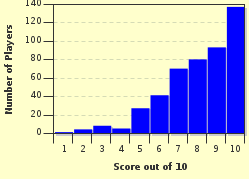Quiz Answer Key and Fun Facts
1. The epistle of James is often described as the most Jewish of the New Testament books. Bearing this in mind, to whom does James address the letter?
2. The letter of James has had its detractors. Martin Luther, for example, described it as an "epistle of straw". Which of the following points has been particularly debated?
3. "What good is it, my brothers, if a man claims to have faith but has no deeds?" (James 2 v. 14)
The central theme of the letter is that true faith should reveal itself in practical actions. What does James say will be the driving force for such actions?
4. "If you really keep the royal law found in Scripture, '____________,' you are doing right." (James 2 v. 8)
Which of the following does James describe as "the royal law"?
5. Which body part does James single out as being particularly significant?
6. "My brothers, can a fig tree bear olives, or a grapevine bear figs?" (James 3 v. 12) What answer does James give?
7. "What causes fights and quarrels among you?" (James 4 v. 1)
Which of the following does James give as a reason for fights and quarrels?
8. "Why, you do not even know what will happen tomorrow. What is your life?" (James 4 v. 14)
James uses which of these examples to illustrate the ephemeral nature of human life?
9. "Be patient, then, brothers, until the Lord's coming." (James 5 v. 7)
In advocating perseverance, James points to which Old Testament character?
10. "Is any one of you sick?" (James 5 v. 14)
If you are sick, then James recommends that you call the elders of the church, who should do what?
Source: Author
glendathecat
This quiz was reviewed by FunTrivia editor
CellarDoor before going online.
Any errors found in FunTrivia content are routinely corrected through our feedback system.

